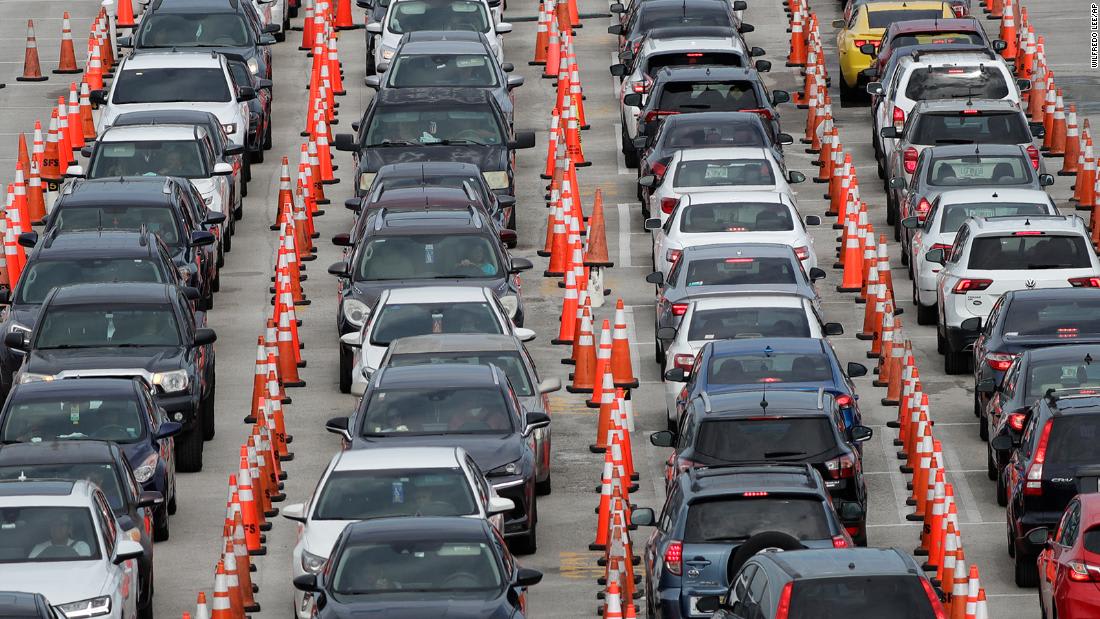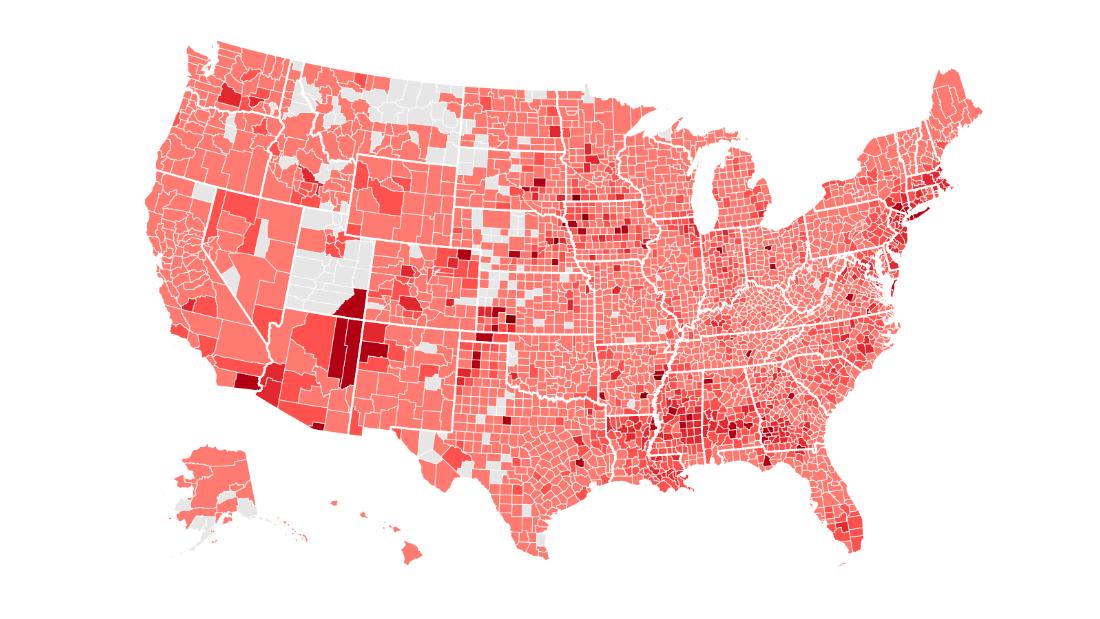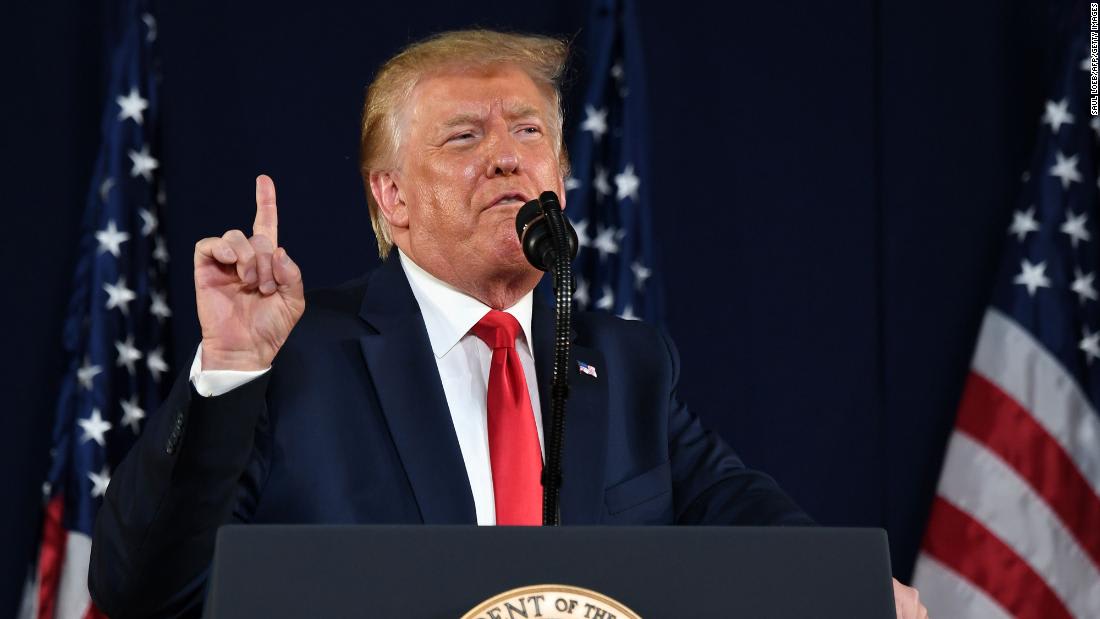Melbourne is deemed a coronavirus 'hotspot'
From CNN's Angus Watson and Maija Ehlinger
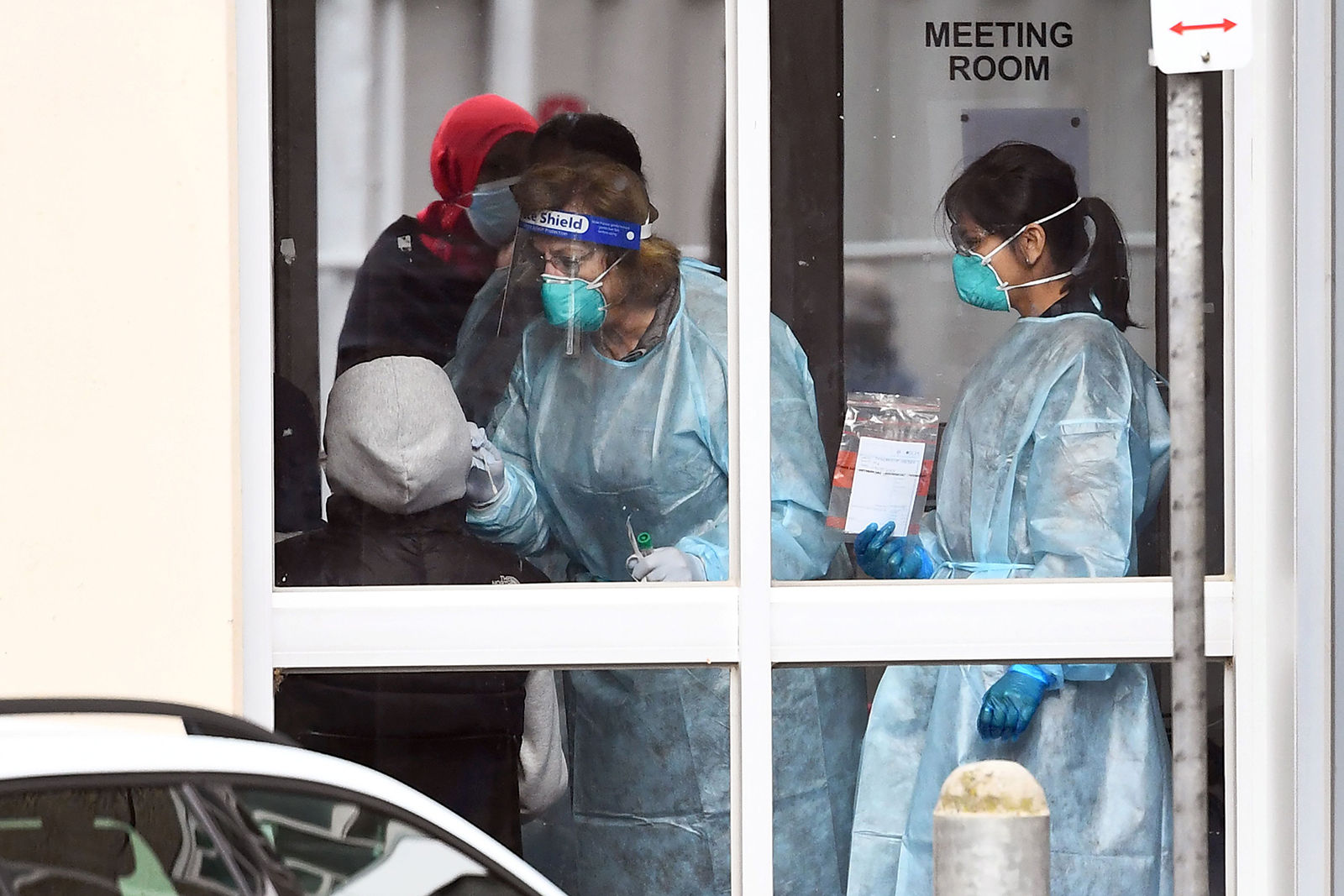 Medical staff perform a Covid-19 test on a resident of one of nine public housing estates locked down due a spike in infection numbers in Melbourne on July 6. William West/AFP/Getty Images
Medical staff perform a Covid-19 test on a resident of one of nine public housing estates locked down due a spike in infection numbers in Melbourne on July 6. William West/AFP/Getty ImagesAustralia's timeline for restricting travel across the state border between New South Wales (NSW) and Victoria has been moved up, after all of Melbourne was deemed a coronavirus hotspot, officials say.
Speaking at a press conference Monday morning, NSW Premier Gladys Berejiklian said that "for the next 24 hours the 'hotspots' will extend to all of Melbourne, so no one from the city will be able to cross the border into NSW."
Earlier it was announced that the border between NSW and Victoria, where Melbourne is located, would be temporarily closed from Wednesday morning in order to curb the spread of coronavirus.
In a statement released by NSW government, all travelers returning from Melbourne and the state of Victoria will be required to self-isolate for 14 days and could face "heavy penalties and fines" for non-compliance.
"What is happening in Victoria is very different, which is why we’ve had to take this necessary step," she added.
The border closure announcement came as Victoria confirmed two additional coronavirus-related deaths on Monday. Australia's death count is currently at 106, according to data collected by Johns Hopkins University.
Pakistan's top health official tests positive for coronavirus
From CNN's Sophia Saifi
Pakistan's top health official and special adviser to the prime minister, Dr. Zafar Mirza, confirmed today that he has tested positive for coronavirus.
Mirza, who is leading the government’s public health initiative against the virus, tweeted on Monday morning that he has mild symptoms and is currently isolating at home.
On Friday, Pakistan's Foreign Minister Shah Mahmood Qureshi confirmed that he had tested positive for Covid-19.
Pakistan has a total of 231,817 confirmed cases of the virus, and 4,762 deaths, according to the country’s health ministry.
Officials say states like Arizona and Texas reopened too quickly after soaring cases
From CNN's Christina Maxouris
After a muted holiday weekend -- which saw both measured celebrations and packed crowds -- the United States faces a deep coronavirus crisis as cases continue to climb and more hospitals report they're nearing capacity.
This week marks about two months since many states kicked off their reopening plans -- which now officials across the country say came too quickly.
In Florida, officials shut multiple beaches throughout the state hoping to avoid July 4 crowds. The state reported 9,999 new coronavirus cases Sunday, bringing Florida's total to more than 200,000 infections.
"There's no doubt ... that when we reopened, people started socializing as if the virus didn't exist," Miami Mayor Francis Suarez told ABC This Week.
In Texas, which reported its second highest day of new cases over the weekend, a local leader said the state opened "too early, too much," driving Houston hospitals to surge capacity in recent days.
Read the full story here:
The US reported more than 49,000 new cases today
The United States reported 49,199 new coronavirus cases and 271 new deaths on Sunday, according to Johns Hopkins University.
That raises the national totals to 2,888,635 cases and 129,947 related deaths.
The totals include cases from all 50 states, the District of Columbia and other US territories, as well as repatriated cases.
Follow our live tracker of US cases here:
California reports more than 11,700 new cases, the biggest one-day jump in the US so far
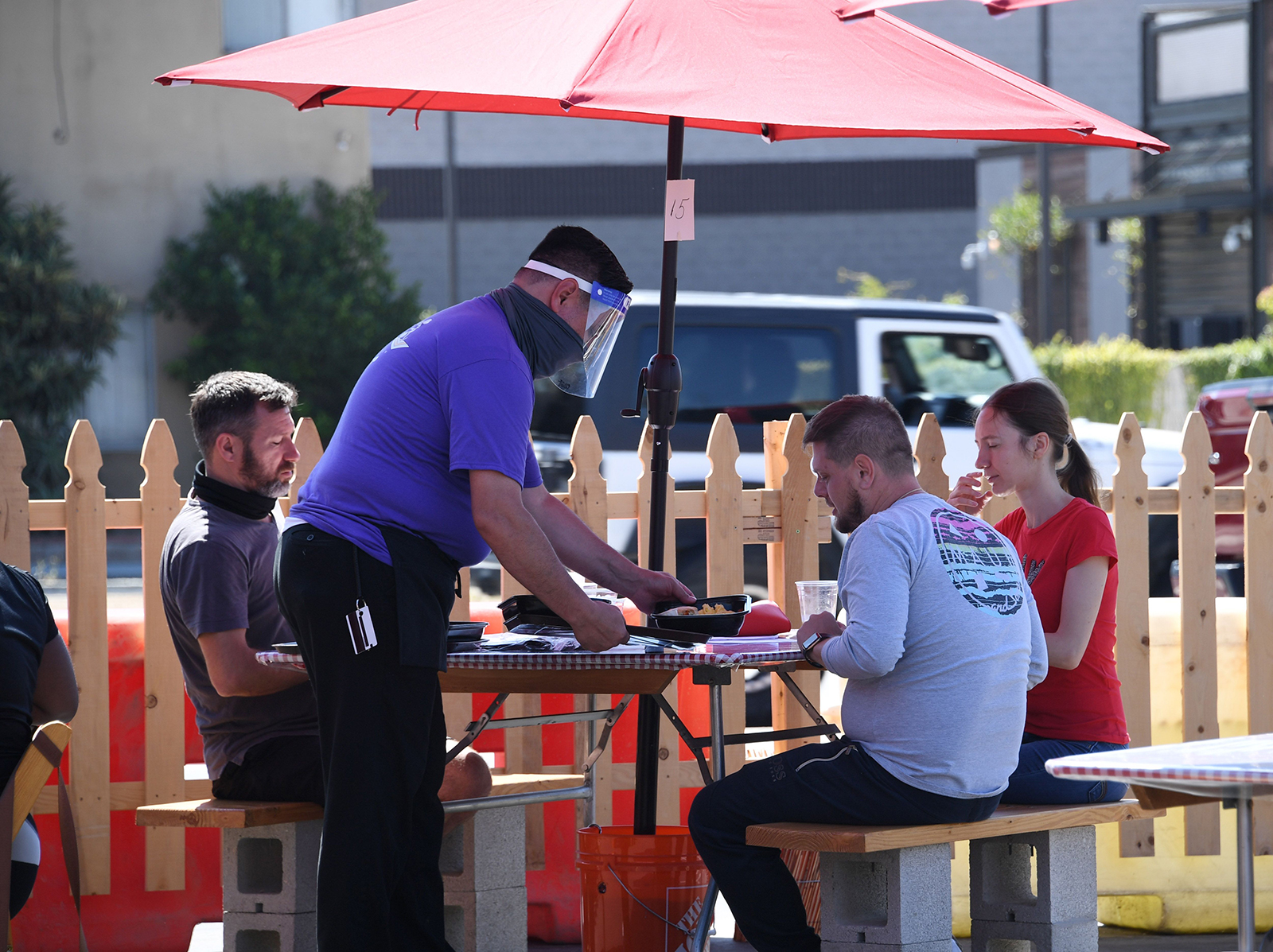 A waiter wearing protective gear serves food to customers on the patio at Pann's restaurant and coffee shop on July 4, in Los Angeles. Robyn Beck/AFP/Getty Images
A waiter wearing protective gear serves food to customers on the patio at Pann's restaurant and coffee shop on July 4, in Los Angeles. Robyn Beck/AFP/Getty ImagesCalifornia recorded 11,786 new cases of coronavirus on Sunday -- the highest one-day jump in cases seen anywhere in the US so far, according to data by Johns Hopkins University.
California, New York, and Florida are now the only three states to have recorded daily case totals above 10,000.
California also reported 39 new deaths on Sunday, according to JHU.
The new figures raise the state's total to 264,681 confirmed cases and 6,373 related deaths, according to JHU.
The Taj Mahal will stay shut while monuments across India reopen
From CNN's Esha Mitra.
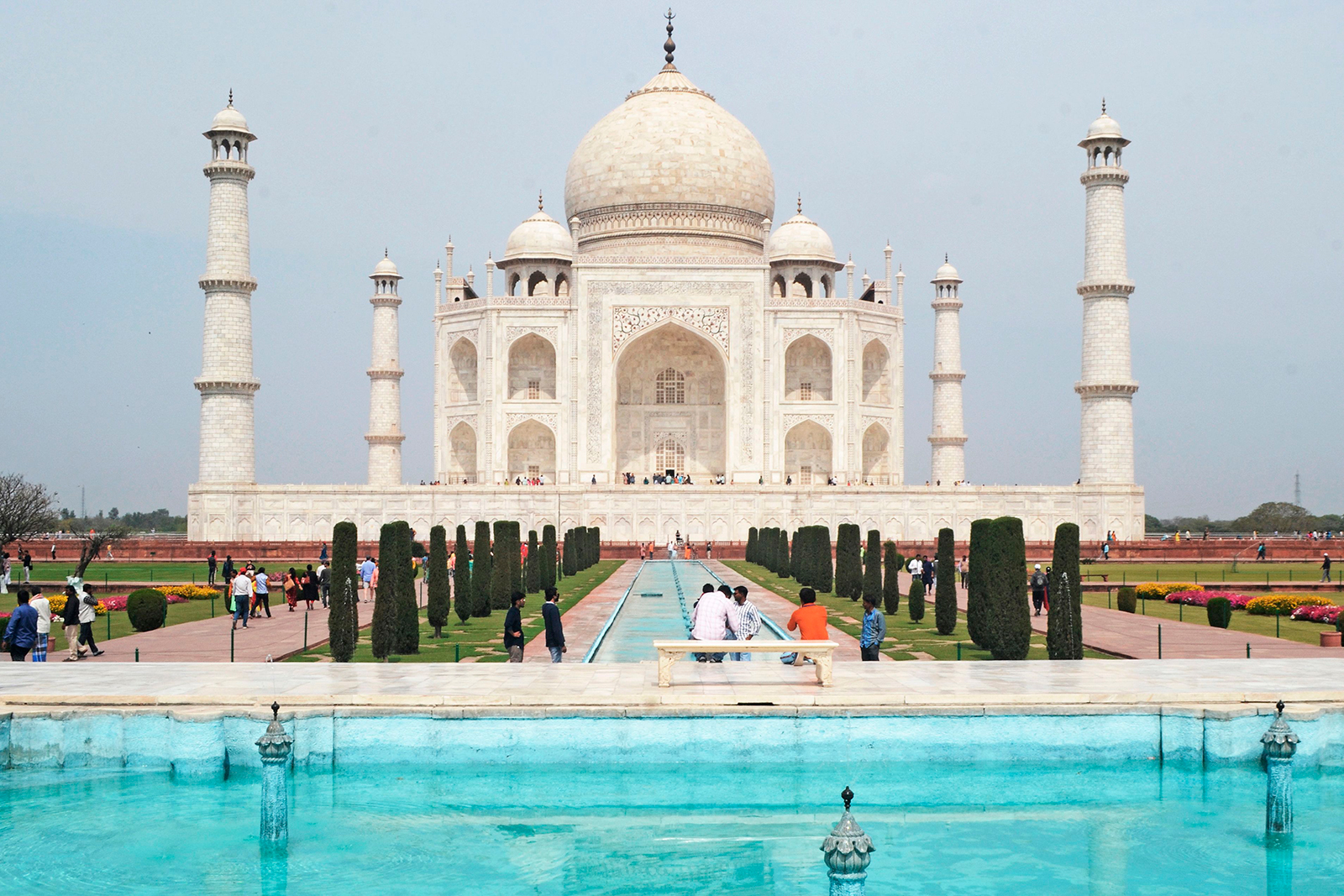 A low number of tourists are seen at Taj Mahal in Agra on March 16. Pawan Sharma/AFP/Getty Images
A low number of tourists are seen at Taj Mahal in Agra on March 16. Pawan Sharma/AFP/Getty ImagesIndia's iconic Taj Mahal will remain closed, even as other monuments reopen around the country, due to the high risk of coronavirus, announced the Agra city district magistrate on Sunday.
All centrally protected monuments are reopening today, with new rules to prioritize "sanitation, social distancing & other health protocols," according to the Ministry of Tourism.
While the Taj Mahal is among India's centrally-protected monuments, the district magistrate's order said that the monument would stay closed because it's located in a "buffer zone" -- an area between two containment zones where restrictions are in place to limit the spread of coronavirus.
Several other monuments in Agra, such as the Agra Fort and Fatehpur Sikri, will also remain closed, according to the order.
There are 3,691 centrally protected monuments nationwide, according to the Ministry of Culture. They have largely been shut since March 17.
Of these, about 820 monuments considered places of worship were allowed to reopen in early June. The rest finally reopen today, with new protocols like e-ticketing and a daily cap on visitor numbers.
India now has the third highest number of coronavirus cases in the world
From CNN's Manveena Suri in New Delhi and Maija Ehlinger in Atlanta
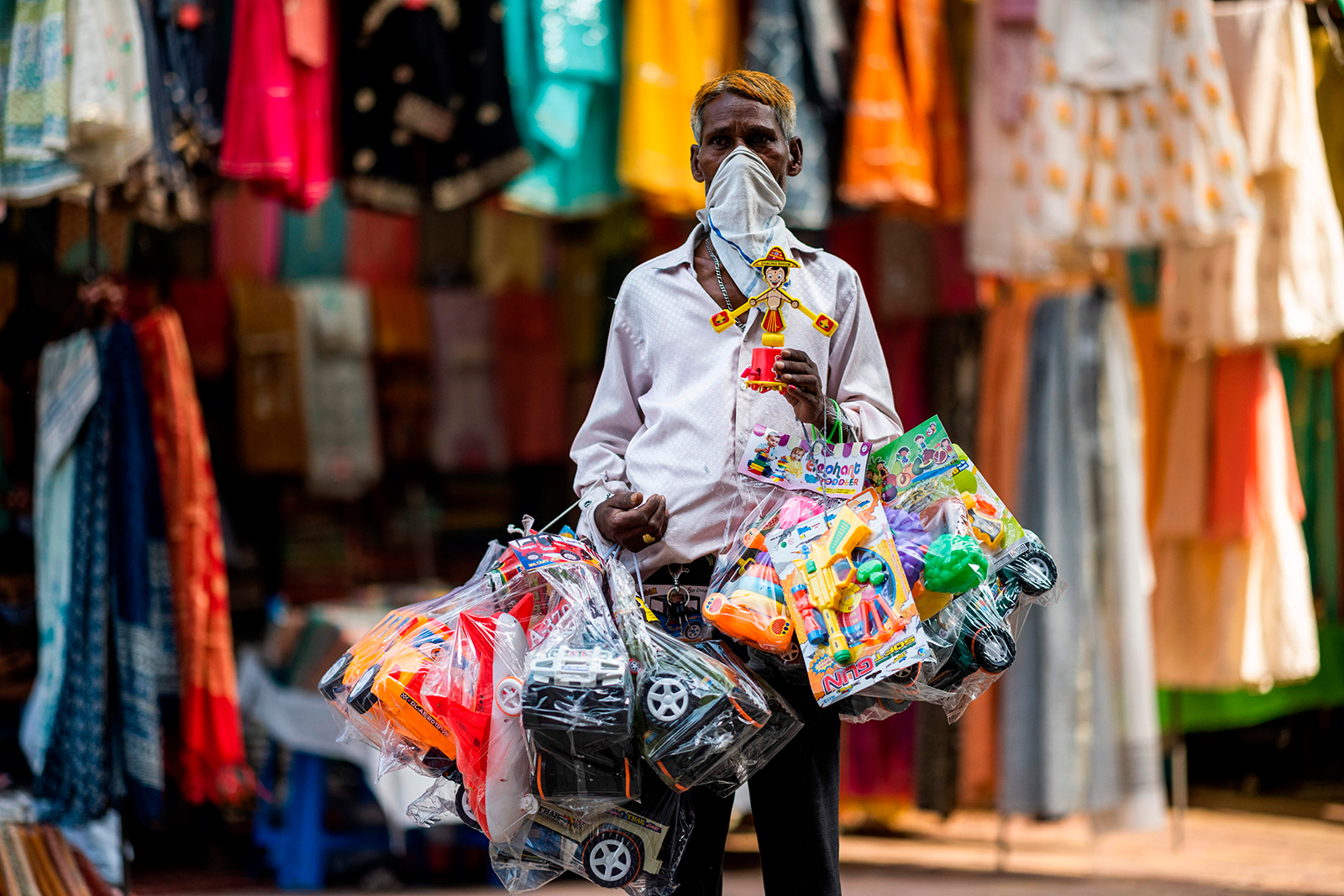 A vendor selling toys waits for customers in a market area in New Delhi on July 5. Jewel Samad/AFP/Getty Images
A vendor selling toys waits for customers in a market area in New Delhi on July 5. Jewel Samad/AFP/Getty ImagesOn Monday, India's Ministry of Health and Family Welfare announced 24,248 new coronavirus cases recorded in the past 24 hours, raising the national total to 697,413 cases.
With the new figures, India surged past Russia's 680,000 total cases to become the third worst-hit nation globally.
Only the US, with 2.8 million cases and Brazil, with 1.6 million, have more confirmed cases, according to data by John Hopkins University.
This comes as the southern state of Kerala implements a strict week-long lockdown in the capital Thiruvananthapuram.
The lockdown began Monday morning and all non-essential businesses and public transportation are shut down, according to a notification issued by district authorities.
As Trump gaslights America about coronavirus, Republicans face a critical choice
Analysis from CNN's Maeve Reston
The gulf between reality and President Donald Trump's delusional vision of a waning coronavirus threat was on full display this weekend, as cases soared in key hotspots while he delivered speeches at Mount Rushmore and at the White House, with little physical distancing and few masks, directly contradicting the advice from his public health experts.
Playing with fire at a time when public health experts say the spread of the virus appears to be spiraling out of control, Trump continued gaslighting Americans about the threat to their health. During a Fourth of July speech from the South Lawn of the White House, he minimized the dangers of Covid-19 with a baseless statement that 99% of coronavirus cases are "harmless" -- a claim his Food and Drug Administration chief could not back up Sunday morning.
With many Americans flouting public health guidelines during the holiday weekend, Trump's conduct is creating an inflection point for the GOP at a time when his poll numbers have tumbled.
With American lives on the line, the question now is whether members of the Republican Party will continue to stand by in silence as the President peddles fiction about a deadly virus, and if so, will they pay a price at the ballot box in November.
While Republicans deserted Trump on the issue of facial coverings -- with many urging Americans to wear masks over the past week -- they have been mostly silent about Trump's effort to deceive the public about the risks the virus poses.
Read the full analysis here:
Coronavirus can float and transmit in air droplets, experts say
From CNN's Maggie Fox
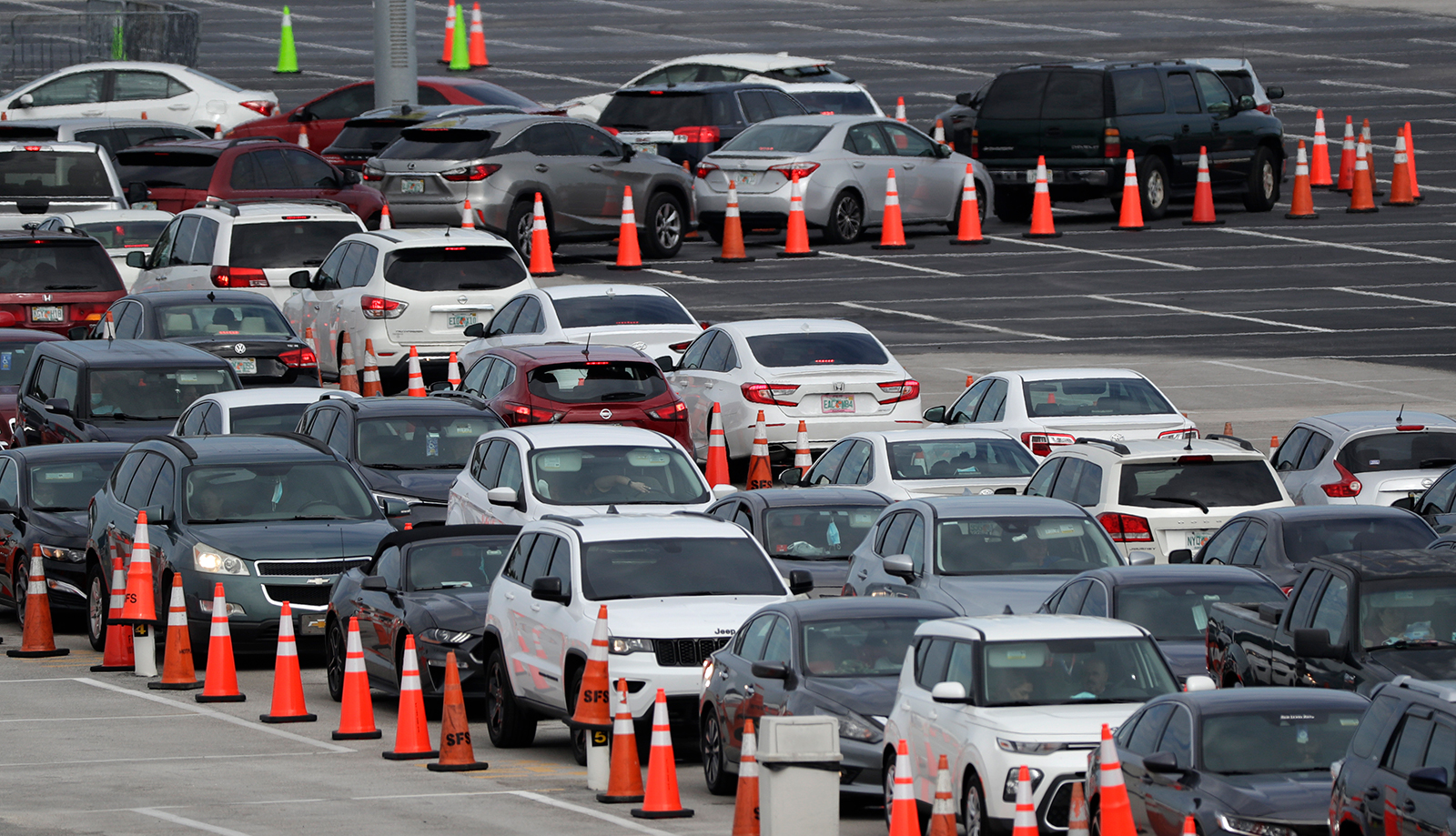 Lines of cars wait at a drive-through coronavirus testing site, on Sunday, July 5, outside Hard Rock Stadium in Miami Gardens, Florida. Wilfredo Lee/AP
Lines of cars wait at a drive-through coronavirus testing site, on Sunday, July 5, outside Hard Rock Stadium in Miami Gardens, Florida. Wilfredo Lee/APCoronavirus can float in air droplets and is likely transmitting that way, according to a group of international experts.
The group is planning to publish an open letter on Monday to the World Health Organization and other health agencies, asking them to be more forthright in explaining how the virus can transmit in the air.
The letter is signed by 239 scientists from around the world.
It’s not a secret; health experts and countries around the world, like Japan, have warned for months that the virus transmits in close contact in crowded spaces with poor ventilation due to how it travels through droplets.
But agencies seem to be afraid to talk about the airborne nature of the virus, said Donald Milton, one of the authors and a professor at the University of Maryland.
What airborne transmission means: The virus is carried on droplets that come out of people’s mouths and noses, and the sizes of those droplets vary.
Large droplets fall onto surfaces rapidly and can be picked up on fingers and carried to the eyes, nose or mouth. Smaller droplets can stay in the air longer, and can be inhaled more deeply into the lungs.
We still don't clearly understand how important droplet size is to coronavirus transmission, Milton said -- but studies show it’s a factor.
A loud bar, where people must shout to be heard, is a perfect storm of close contact, poor air circulation and people generating a lot of virus-carrying particles by talking, laughing and bellowing.
What we can do about it: Milton said the best way to protect against fine aerosols is to use an N-95 respirator or higher – something in scarce supply in many places.
But there are others ways, too, including improved ventilation, as well as distancing and mask use. That’s information the average person can use and act on.
“I am very much concerned about the general public and schools and ventilation in school buildings and in dorms on college campuses and in bars and in churches and where people sing and where people congregate,” he said.

 5 years ago
627
5 years ago
627 